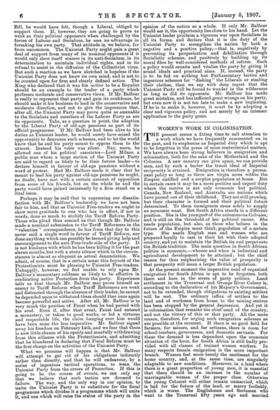WOMEN'S WORK IN COLONISATION.
fillHE present seems a fitting time to call attention to 1 a work which we have frequently commented on in the past, and to emphasise an Imperial duty which is apt to be forgotten in the press of more controversial matters. We have always been strong believers in emigration and colonisation, both for the sake of the Motherland and the Colonies. A new country can give space, we can provide men, and by such a barter the truest ideal of Imperial reciprocity is attained. Emigration is therefore a perma- nent policy so long as there are virgin acres within the Empire untilled and a surplus population at home. But in certain cases it may be a more positive and urgent duty where the motive is not only economic but political. Canada, New Zealand, and Australia are nations which have passed out of their childhood. They are still growing, but their character is formed and their political future determined. To them immigrants come solely to supply an economic want. But South Africa stands in a different position. She is the youngestsof the autonomous Colonies, and is still on the threshold of her political career. She needs population, but also, as those who believe in the future of the Empire must think, population of a certain type. She needs English men and women who are prepared loyally to cast in their lot with their adopted country, and yet to maintain the British tie and perpetuate the British tradition. The main question in South African politics is economic,—whence and when is industrial and agricultural development to be attained; but the chief reason for thus emphasising the value of prosperity is that prosperity will mean a larger British population.
At the present moment the imperative need of organised emigration for South Africa is apt to be forgotten both there and here in the stress of party politics. Land settlement in the Transvaal and Orange River Colony is, according to the declaration of his Majesty's Government, not to be extended, though obligations to existing settlers will be met. The ordinary influx of settlers to the land and of workmen from home to the mining centres has been stopped by the general depression. And yet it is colonisation that remains the chief need of the country, and not the victory of this or that party. All the more reason, therefore, for urging such emigration schemes as are possible at the moment. If there is no good field for farmers, for miners, and for artisans, there is room for school-teachers, governesses, and domestic servants. For these the demand is less dependent upon the economic situation of the hour, for South Africa, is still badly pro- vided with all classes of trained women workers. In many respects female emigration is the more important branch. Women feel more keenly the sentiment for the home country, and, at the same time, are singularly adaptable to new conditions. Moreover, in a land where there is a great proportion of young men, it is essential that there should be an increase in the number of marriageable women of the proper class. Otherwise the young Colonist will either remain unmarried, which is bad for the future of the land, or marry foolishly, which is worse. The Englishmen and Scotsmen will) went to the Transvaal fifty years' ago and married
Dutch girls have left families more Dutch in spirit than the voortrekkers themselves. It is the mother's nationality which counts, and no better service can be done to the Empire than to ensure that the younger generation of British Afrikanders shall have the chance of marrying women of their own class and creed. It is no question of the exportation of .young women purely for the sake of marriage. The emigrants go out to supply an urgent economic and social'want. But there is always the likeli- hood that they may be absorbed into the new population in a more vital sense, by becoming, net merely settlers themselves, but the wives and mothers of settlers.
It is difficult to praise sufficiently the work which organi- sations like the Victoria League, the League of the Empire, and the British Women's Emigration Association have been doing for the past half-dozen years. It has been quiet and unobtrusive work, done without advertisement or controversy, but it has been in the truest sense con- structive Imperialism, which puts to shame more noisy propaganda. We wish to call special attention to the work of one body, the South African Colonisation Society. Lord Tennyson's Committee reported that in South Africa "there does not at present seem to be any opening for those who would be ordinarily classed as emigrants, except indeed for women, for whom there is a considerable demand." It has been the aim of the Society to meet this demand, and their method has very properly been one of carefully organised emigration, with super- vision from start to finish. Lord Tennyson's Committee, it will be remembered, were inclined to deprecate too fatherly a system, urging that the proper emigrant required a start, and uo more, to succeed. But with women the case is obviously different. It is impossible to send young girls out to a new country, where living is expensive, distances great, and dangers many, without making ample provision for their reception. The South African Colonisation Society seems to us to provide a model in scientific colonisation. The unaided efforts of a few ladies have elaborated a system which works without a hitch, and how difficult such a task is only those who have been concerned in like enterprises can know. From January, 1902, to March, 1906, the Society sent out two thousand eight hundred and seventeen emigrants. Few of these were failures. For example, out of one hundred and ninety-three girls sent to the Transvaal—for obvious reasons the most difficult Colony—between June, 1904, and June, 1905, only two were returned as " morally unsatis- factory." Applications are received by the Society from girls in England and from employers in South Africa. All arrangements are made by the officials to ensure getting the right person for the right place, and for arranging passages and advancing the necessary money. The girls spend the night before they sail in the London hostel of the Society, and a matron takes charge of each party on the voyage. There are hostels for the reception of the emigrants at the South African ports of landing and in the chief up-country towns, where board and lodging can be obtained at a much cheaper rate than in any public hotel. Moreover, the Society's agents meet the emigrants, arrange for their journeys, and endeavour to keep in touch with them for a year or two after they have taken up their employment. It is all admirably arranged, and with such management it is small wonder that the percentage of failures is low. The Society works in conjunction with the Colonial Office and the different South African Govern- ments in their schemes of assisted emigration, but it also acts on its own account, providing loans in deserving cases which are not covered by Government grants. Among the emigrants are found every class of wage-earning women, from domestic servants to nurses, though, as was to be expected, the former predominate. Admirable work is being done in finding posts for white women servants in country districts, where hitherto the mistress of the house has been dependent on Kaffir boys. It is in such districts that British women are most needed and their influence greatest, A separate and most important branch of the work is concerned with education, where the Society acts as intermediary between the Colonial Govern- ments and applicants in England. It provides not only teachers for elementary and secondary schools, but governesses for the country farms, and it would appear as if the demand in this branch were likely to outrun the supply. And all these manifold operations are conducted economically and efficiently by a committee of ladies and a small permanent staff.
The South African Colonisation Society is a good instance of the kind of work which we wish to see extended. It is of vital importance to the future of South Africa within the Empire, and it is wholly uncontroversial. Conservative and Radical can unite in furthering an object which is so clearly to the public good. We trust that this Society and other kindred societies will meet with adequate support, especially at a time when their work remains almost the sole direct way in which the British people can co-operate in safeguarding the future of South Africa. " When the 'Plantation grows to Strength," Bacon wrote, "then it is time to Plant with Women as well as with Men, That the Plantation may spread into Generations, and not be ever pieced from without."















































 Previous page
Previous page